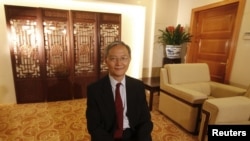China announced on Friday that its special envoy for Africa is now in South Sudan to help push talks as the world's newest country spirals into violence.
“On behalf of the Chinese government, special envoy Zhong Jianhua is currently visiting South Sudan and neighboring countries, and actively carrying out mediation efforts. China is willing to continuously enhance communication and coordination with all the relevant parties and jointly push for restoration of stability in South Sudan,” Foreign Ministry spokeswoman Hua Chunying told a regular news conference in Beijing.
Zhong is a veteran diplomat and knowledgeable of the conflict in South Sudan.
Violence erupted in the capital, Juba, on December 15 and quickly spread, dividing the land-locked country of 10.8 million people along ethnic lines. Hundreds have been killed and some 45,000 civilians are seeking protection at U.N. bases.
Hua said China would provide more humanitarian aid to South Sudan if needed.
“To express the friendly feeling the Chinese people hold towards the South Sudanese people, China has provided emergency humanitarian aid to the international committee of the Red Cross through the Chinese Red Cross. We will continue to offer assistance within our capability based on the development of the situation and the need of the South Sudanese people,” Hua said, without providing more details.
China has extensive energy interests in South Sudan.
It is already the biggest investor in oil fields in South Sudan, through state-owned Chinese oil giants China National Petroleum Corp (CNPC) and Sinopec. Beijing is also one of Sudanese President Omar Hassan al-Bashir's major supporters.
The fighting has also oil production, which accounts for 98 percent of government revenue in South Sudan. CNPC has been forced to evacuate some of its workers.
“On behalf of the Chinese government, special envoy Zhong Jianhua is currently visiting South Sudan and neighboring countries, and actively carrying out mediation efforts. China is willing to continuously enhance communication and coordination with all the relevant parties and jointly push for restoration of stability in South Sudan,” Foreign Ministry spokeswoman Hua Chunying told a regular news conference in Beijing.
Zhong is a veteran diplomat and knowledgeable of the conflict in South Sudan.
Violence erupted in the capital, Juba, on December 15 and quickly spread, dividing the land-locked country of 10.8 million people along ethnic lines. Hundreds have been killed and some 45,000 civilians are seeking protection at U.N. bases.
Hua said China would provide more humanitarian aid to South Sudan if needed.
“To express the friendly feeling the Chinese people hold towards the South Sudanese people, China has provided emergency humanitarian aid to the international committee of the Red Cross through the Chinese Red Cross. We will continue to offer assistance within our capability based on the development of the situation and the need of the South Sudanese people,” Hua said, without providing more details.
China has extensive energy interests in South Sudan.
It is already the biggest investor in oil fields in South Sudan, through state-owned Chinese oil giants China National Petroleum Corp (CNPC) and Sinopec. Beijing is also one of Sudanese President Omar Hassan al-Bashir's major supporters.
The fighting has also oil production, which accounts for 98 percent of government revenue in South Sudan. CNPC has been forced to evacuate some of its workers.





